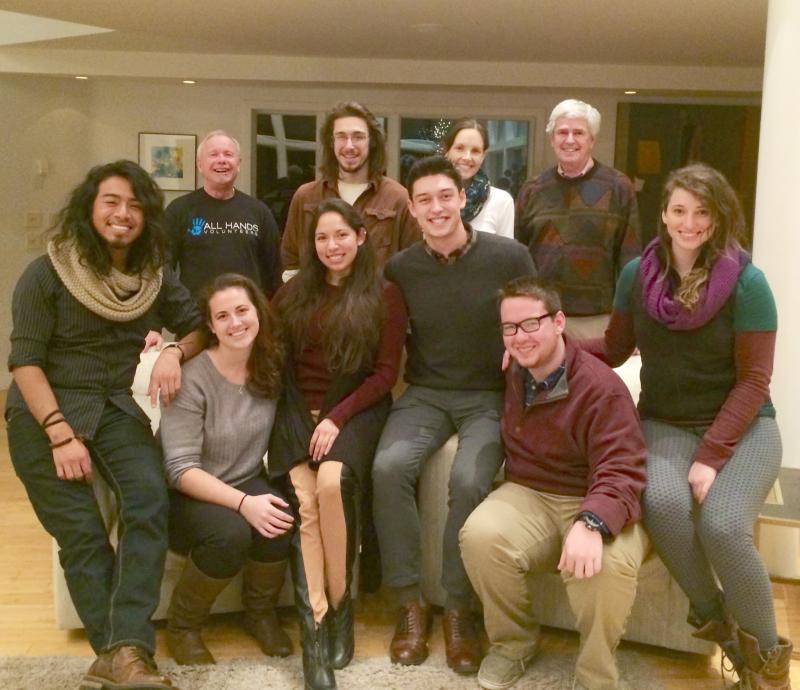All Hands Volunteers mobilizes 'magnificent seven' to serve
All Hands Volunteers has set itself apart as an aid organization that not only responds to crises but stays through the recovery process, reaching out to communities with projects that are both practical and unique.
Founded only 10 years ago, the Mattapoisett-based nonprofit provides disaster recovery and rebuilding services both domestically and internationally.
As a relatively young organization, it is now in the process of developing a stronger employee base through the Global Service Fellowship, a pilot program aimed at turning dedicated volunteers into well-equipped humanitarian workers.
The Global Service Fellowship brings together seven volunteers who were handpicked from past and current service projects to learn the ins and outs of All Hands’ on the ground operations.
Michael Hecker is one of two program directors, along with Kate Thompson, chosen to run the 11-month fellowship.
“All Hands [Volunteers] attracts very bright people, amazingly so,” he said. “We definitely have the magnificent seven.”
Leadership at All Hands requires empathy, organizational skills and often the ability to think outside the box in areas that can be hazardous and chaotic. Volunteers are not only expected to clear away debris and construct new buildings, but to become a part of the communities they serve. This model has inspired such initiatives as movie nights for kids in the Philippines and Malawi and a photo recovery project in Japan.
Each project also has a lot of turnover and transition as volunteers come and go and projects open and close, which can lead to leadership gaps.
With the fellowship, “the idea, of course, is to increase the capacity of the organization, to better prepare people for taking on a management level job,” said Hecker, who has been mentoring the leadership at All Hands Volunteers' Detroit project.
With the fellowship, All Hands hopes to create a “bench” of qualified people who share the organization’s mission to “respond, recover and renew” and who have practical on-the-job experience.
The volunteers are a young group and have all demonstrated a passion for helping others.
Nicolette Koerner, a 24-year-old New Jersey native, said she was too young to volunteer after Hurricane Katrina hit the South, but she said, “I remember…wanting to help people get their lives together.”
She went on to work with AmeriCorps and the Jewish disaster response group NECHAMA. While working with NECHAMA, Koerner was introduced to All Hands during a joint project.
“I just fell in love on my project,” she said.
Four All Hands projects later, Koerner said, “I’ve tried to have a normal life since then, and I haven’t been very successful.”
She jumped at the opportunity to be part of the Global Fellowship Program.
“Us disaster response junkies are up for an adventure,” she said. “I knew it was going to be difficult, but I rarely turn down an exciting experience.”
The program is comprised of two approximately five-month stints in the field, one domestic and one international, where fellows will shadow leadership and put into practice things they learned during a two-week orientation program completed Jan. 23.
Held in Boston and Marion, the fellows heard from business, nonprofit professionals and Executive Director Erik Dyson on everything from the importance of photography in the field to engaging businesses as partners and conflict resolution.
Homar Maximiliano, a fellow from Denver, Colorado, who recently served as a team leader of All Hands’ Project Nepal is excited for what the fellowship means for the organization.
“All Hands is really looking into the future and really looking to strengthen itself from the inside out,” he said. “This is a wonderful opportunity for those of us involved and for the organization itself as well.”
For Maximiliano, an outdoorsy guy with experience in AmeriCorps and the Civilian Conservation Corps, the training was an important look into the organization of All Hands and into responding to natural disasters.
One takeaway he had from the training was that “we always have to be ten steps ahead. It takes a lot of effort to make a nonprofit succeed and be effective.”
The seven fellows are currently on their way to Nepal and Detroit, and Hecker said he is hopeful that this pilot class will do well.
“They’ll come away with some understandings of leadership that other people won’t have the benefit of,” said Hecker, who will visit the fellows over the next few months and regularly check in on their progress. “Their experiences will benefit each other as well as the organization.”
“Disaster response junkies” that they are, the fellows are going confidently into their new role
“I’m excited for the unknown of it all. I think there’s so much potential for us in this organization,” said Maximiliano.















